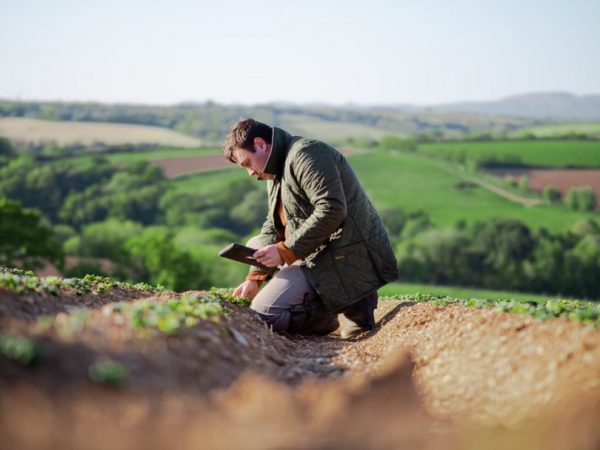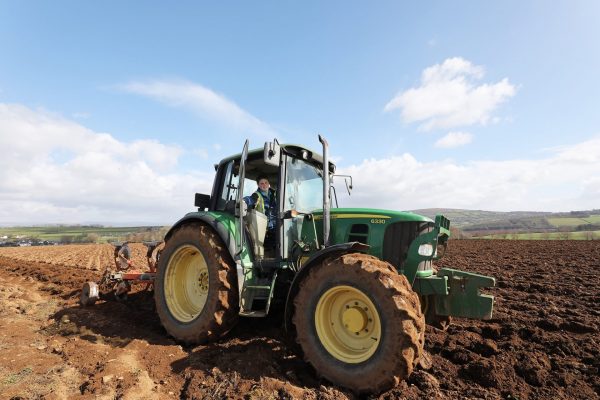Crop Technician Apprenticeship Standard
Duchy College Rosewarne - as required
Duchy College Rosewarne - as required
18 months
Work-based
Crop Technician Apprenticeship Standard
 The crops grown in the UK form the very basis of our diets, and primary ingredients for a wide range of food products, but their significance does not end there.
The crops grown in the UK form the very basis of our diets, and primary ingredients for a wide range of food products, but their significance does not end there.
The recent introduction of the Arable Soil Standard in June 2021 as part of the government’s Environmental Land Management (ELM) and Sustainable Farming Incentive (SFI) plans, has brought about a new focus on meeting land management targets.
As a Crop Technician you will play a vital role in meeting these targets by optimising crop/plant yields through establishment, management, harvest and post-harvest operations, while maintaining and improving the surrounding environment. You will also need to keep up to date with technological advances and new innovations.
Being a Crop Technician requires self-motivation and the ability to work both independently and as a team player to complete tasks safely and efficiently. Many companies now use automation for a number of routine tasks, which will require technical skills to operate.
This standard provides the opportunity for individuals to acquire the ‘knowledge’, ‘skills’ and ‘behaviours’ required and follows a ‘core and options’ approach. This allows the flexibility to learn core subjects and then specialise in either ‘soil based systems’ or ‘containerised systems’.
What you will learn
Crop Establishment
• Prepare seed bed/growing medium for maximum growth potential
• Carry out relevant establishment of crops for efficient growth
Vehicle Operation
• Competently operate (to the equivalent of a certified level) a relevant vehicle used in the business
Crop Management
• Control of pests, weeds and diseases including safe use, application and storage of chemicals
• Carry out plant nutrient application and/or irrigation tasks if applicable to aid growth of crop
Harvest
• Carry out harvesting operations including assessment of timing and quality
• Appropriate harvesting techniques to match crop condition and quality requirements
• Operate to high levels of hygiene
Storage
• Store crops in suitable conditions to maintain quality
Maintenance and preparation
• Soil/substrate maintenance tasks to ensure efficient and healthy growth of the crop/plant
• Soil/substrate sampling and acting upon results as appropriate to ensure nutrition is correct
Option - Soil based system
Soil based systems are used to grow a wide variety of crops in fields. This includes cereals, oilseeds, a number of vegetables and fruit trees. Production is dependent on the natural resources and physical inputs (plant nutrients etc) and very reliant on the weather which has a significant impact on the growth and ultimate management of a crop. This means you must have the knowledge and ability to adapt at short notice to ensure a high-quality product.
Specific skill requirements:
• Correctly set machinery and monitoring machine performance for good seed establishment and crop growth
• Correctly set machinery to match crop and soil condition and quality requirements during harvest
• Maintenance of non-productive areas
Specific knowledge requirements:
• Impact of machinery on soil structure and potential damage.
Option - Container based system
Container based systems are generally used within horticulture to grow plants and trees but can also be used for fruit production. In a containerised system, the environment is ‘managed’ and it is likely you will spend a proportion of your time indoors. Container production will involve monitoring and caring for vast numbers of plants on an individual basis, requiring good observational skills and attention to detail.
Specific skill requirements:
• Optimise growth conditions for specific crops, based on the individual needs of the plant relative to environment
• Maintenance of productive and non-productive areas
• Plant removal
Specific knowledge requirements:
• Difference growing mediums and their impact/relevance to production on site.
As a gateway requirement and prior to taking the EPA, apprentices must complete all approved qualifications mandated in the standard:
Level 2 Awards in:
• Safe use of Pesticides
• Additional safe use of Pesticides in Boom Sprayer, Mounted, trailer or Self-propelled equipment OR Granular applicator equipment OR Handheld applicator equipment
• Emergency First Aid at Work – Level 3
Entry requirements
GCSE English and maths at grade 3, as well as an employer willing to hire you as an apprentice
A good reference
A satisfactory interview
Assessment
Typically an apprentice will spend 18 months on-programme working, with a minium of 20% off-the-job training.
The End Point Assessment (EPA) will only start once the employer is satisfied that the apprentice is consistently working at or above the level set out in the occupational standard and it will consist of a multiple-choice assessment. The EPA must be completed within six months.
Progression
Progress onto a L4 programme and/or employment

Duchy College Rosewarne
This beautiful campus set just outside of Camborne has a rich history of national research and is cherished by students and staff. Whether its studying horticulture or animal care, the intimate community feel is the perfect learning environment. With a friendly and entertaining student hub, and the most passionate and dedicated team on hand to support the college experience, Duchy College Rosewarne is renowned for its student experience. Home to the most wonderful animals and plants, this is a truly unique and special place to have your #careercollege experience.
• Prepare seed bed/growing medium for maximum growth potential
• Carry out relevant establishment of crops for efficient growth
Vehicle Operation
• Competently operate (to the equivalent of a certified level) a relevant vehicle used in the business
Crop Management
• Control of pests, weeds and diseases including safe use, application and storage of chemicals
• Carry out plant nutrient application and/or irrigation tasks if applicable to aid growth of crop
Harvest
• Carry out harvesting operations including assessment of timing and quality
• Appropriate harvesting techniques to match crop condition and quality requirements
• Operate to high levels of hygiene
Storage
• Store crops in suitable conditions to maintain quality
Maintenance and preparation
• Soil/substrate maintenance tasks to ensure efficient and healthy growth of the crop/plant
• Soil/substrate sampling and acting upon results as appropriate to ensure nutrition is correct
Option - Soil based system
Soil based systems are used to grow a wide variety of crops in fields. This includes cereals, oilseeds, a number of vegetables and fruit trees. Production is dependent on the natural resources and physical inputs (plant nutrients etc) and very reliant on the weather which has a significant impact on the growth and ultimate management of a crop. This means you must have the knowledge and ability to adapt at short notice to ensure a high-quality product.
Specific skill requirements:
• Correctly set machinery and monitoring machine performance for good seed establishment and crop growth
• Correctly set machinery to match crop and soil condition and quality requirements during harvest
• Maintenance of non-productive areas
Specific knowledge requirements:
• Impact of machinery on soil structure and potential damage.
Option - Container based system
Container based systems are generally used within horticulture to grow plants and trees but can also be used for fruit production. In a containerised system, the environment is ‘managed’ and it is likely you will spend a proportion of your time indoors. Container production will involve monitoring and caring for vast numbers of plants on an individual basis, requiring good observational skills and attention to detail.
Specific skill requirements:
• Optimise growth conditions for specific crops, based on the individual needs of the plant relative to environment
• Maintenance of productive and non-productive areas
• Plant removal
Specific knowledge requirements:
• Difference growing mediums and their impact/relevance to production on site.
As a gateway requirement and prior to taking the EPA, apprentices must complete all approved qualifications mandated in the standard:
Level 2 Awards in:
• Safe use of Pesticides
• Additional safe use of Pesticides in Boom Sprayer, Mounted, trailer or Self-propelled equipment OR Granular applicator equipment OR Handheld applicator equipment
• Emergency First Aid at Work – Level 3
A good reference
A satisfactory interview

Duchy College Rosewarne
This beautiful campus set just outside of Camborne has a rich history of national research and is cherished by students and staff. Whether its studying horticulture or animal care, the intimate community feel is the perfect learning environment. With a friendly and entertaining student hub, and the most passionate and dedicated team on hand to support the college experience, Duchy College Rosewarne is renowned for its student experience. Home to the most wonderful animals and plants, this is a truly unique and special place to have your #careercollege experience.
Related Topics
Dates & Locations
- Location - Duchy College Rosewarne
- Start Date - As required
- Tuition Fees: £0.00*
*Please note - Fees apply to adults and HE students only. Only the most common fees scenario is shown. Actual fees may vary depending on your personal situation. Please contact us for further information.
MORE INFORMATION ON FINANCIAL SUPPORT
Information for ages 19+ - Apply Now
- Location - Duchy College Rosewarne
- Start Date - As required
- Tuition Fees: £0.00*
*Please note - Fees apply to adults and HE students only. Only the most common fees scenario is shown. Actual fees may vary depending on your personal situation. Please contact us for further information.
MORE INFORMATION ON FINANCIAL SUPPORT
Information for ages 19+ - Apply Now
Course Code 10308-DRW-00, 10308-DRW-00
Courses listed on this website are indicative of the subject, nature and level of study. The College reserves the right to alter specific qualifications titles, awarding bodies and levels of qualification, which can change in year. Any cost may also vary, based on personal funding eligibility. The Cornwall College Group reserves the right to withdraw any course listed at any time.




